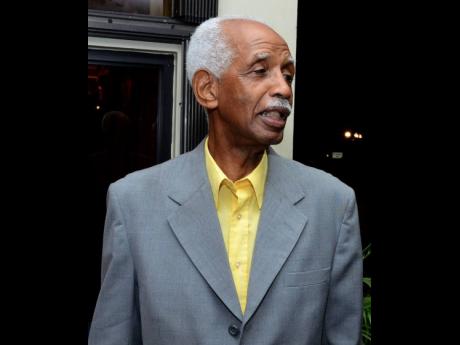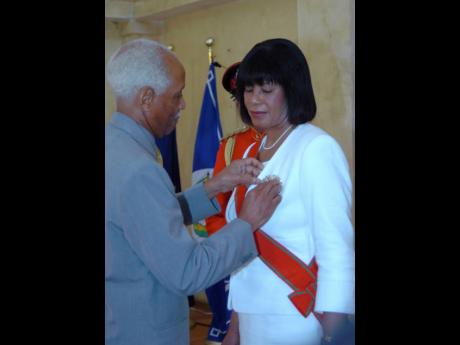Wolfe remembered for commitment to fairness, equality
Leaders, former colleagues salute late retired justice
Former Chief Justice Lensley Wolfe died on Tuesday at age 85.
Serving as the country’s chief justice with distinction from 1996 to 2007, Wolfe provided the judiciary with leadership and oversight characterised by collegiality and impartiality that earned him respect from the highest quarters in the land as well as the Order of Jamaica.
His name became synonymous with public inquiries at home and in the region, and is the one cited in reference to one of the most comprehensive documents ever compiled on the anatomy of crime and violence in Jamaica.
In a tribute, Prime Minister Andrew Holness described Wolfe as a man of immense integrity, wisdom, and dedication to justice.
“He was a beacon of hope and inspiration for all those who sought to uphold the rule of law and promote the common good.
“He will always be remembered for his outstanding contributions to the legal profession and his unwavering commitment to fairness and equality,” said Holness via his Twitter account.
Opposition Leader Mark Golding said the former chief justice “was a trailblazer who left an indelible mark on Jamaica’s legal system”.
Added Golding: “He was fearless, and demanded personal discipline and adherence to high standards of behaviour from all who came before him in court. His contributions as head of the judiciary resulted in significant improvements to the justice system, which will benefit generations to come. Our thoughts and prayers are with his family and loved ones during this difficult time.”
Chief Justices Bryan Sykes noted that Wolfe “was a person who emphasised professionalism, punctuality and forthrightness. He expected high levels of integrity and strongly believed that lawyers and judges alike, should conduct themselves in a manner befitting of their noble offices”.
A past student of St Jago High School in St Catherine, the former chief justice was called to the bar at the prestigious Lincoln’s Inn in London, England, in 1967, following studies at the Inn’s Court Law School.
Exactly 40 years later, in 2007, he became the first serving Jamaican to be inducted as a Bencher of the Inn’s Honourable Society, a privilege reserved for jurists who have distinguished themselves in the practice of law.
Retired Court of Appeal Judge Clarence Walker, who was a close friend, described Wolfe as one of the most hard-working, erudite judges ever produced by Jamaica. He said they joined the court system as teenagers and worked together in the Corporate Area Parish Court, from where they both left in the 1960s to study law in London.
“His judgments were always sound and well-reasoned. In my tenure as a judge of the Court of Appeal and within my knowledge no judgment of his as Chief Justice was ever reversed,” said Walker.
Caribbean Court of Justice President Justice Adrian Saunders noted that the Caribbean has lost one of its finest jurists.
“Chief Justice Wolfe will always be remembered for his tireless work ethic, integrity and forthrightness. His contribution to Jamaican and indeed, Caribbean jurisprudence is well-known among members of the legal fraternity throughout the region and even further afield. His opinions were well-reasoned, clear, down to earth, and practical. I am grateful for the opportunity to have benefited from his wisdom and experience on several occasions,” Saunders said in a statement.
“Additionally, his commitment to improving access to justice for all Jamaicans has inspired generations of attorneys and judicial officers and remains one of the most enduring aspects of his legacy. He will forever be remembered as a resolute champion of justice and will be sadly missed,” he added.
National Task Force on Crime
During his legal career, Wolfe also performed duties as a resident magistrate, a Crown counsel in the Office of the Director of Public Prosecutions, a puisine judge, and a judge of appeal.
Although his name has been associated with the chairmanship of a number of public bodies and working groups, such as the Police Public Complaints Authority and the Jamaican Justice System Reform Task Force, the jurist is best remembered in relation to the National Task Force on Crime established by Prime Minister P.J. Patterson in 1992.
The extensive 1993 document that resulted from the study became known as ‘The Wolfe Report’ and served as a template for addressing one of Jamaica’s most debilitating social ills. It named socio-economic inequities, a deteriorating family life structure, and the development of garrison communities among the root causes of the problem, and pointed to increased social and economic programmes and better policing as some of the solutions. In commenting on another of the document’s findings, namely the horrific conditions that existed within the island’s prisons, Wolfe noted that this was a sad indictment on Jamaica as a civilised country.
In the decades following the publication of the report, its wide-ranging recommendations were repeatedly cited by persons from all sectors of the society who felt strongly that these had to be implemented if any progress were to be made in combating crime and violence.
The high regard in which the former chief justice was held accounted for his being named chairman of the commission of inquiry into an incident involving the death of three men during protests in the Guyanese mining town of Linden in July 2012. He was one of five CARICOM nationals, including former Security and Justice Minister K.D. Knight, selected for the task. Wolfe also led the Jamaica Athletics Administrative Association’s (JAAA) Disciplinary Committee panel that heard the case against local sprinters Veronica Campbell-Brown, Asafa Powell and Sherone Simpson, among other athletes, following their positive drug tests in 2013.
Wolfe presided over several sensational trials with prominent murder defendants; among these were the family of Dr Aubrey Fraser, director of legal education in the Council of Legal Education and retired Trinidad and Tobago Judge of Appeal (1992), Mary Lynch, wife of National Commercial Bank executive Leary Lynch (1994), and Senior Superintendent of Police Reneto Adams who was one of three policemen charged in the fatal shooting of four persons in Kraal, Clarendon (2005). Regardless of the outcome of the inquiries or trials that he heard, however, Chief Justice Wolfe’s rulings were generally regarded as scholarly and indicative of a deep understanding of the respective positions of all the parties involved, and the complexities of the evidence presented.
Nonetheless, the judge was not immune to controversy. His private meeting with the commissioner of police to discuss how the courts should deal with bail for gang members, in 2004, for instance, was described as “inappropriate” by the opposition Jamaica Labour Party (JLP), which said such an action could undermine the independence of the judiciary.
The following year, during the Kraal trial, Wolfe became embroiled in a conflict with members of the media whom he threatened to have disbarred for what he said was their misinterpretation of his instructions to the jury, and he questioned whether this had not been done in an attempt to destroy his reputation.
A firm exponent of restorative justice, Wolfe helped to promote mechanisms to facilitate among victims, the healing of mental wounds that resulted from exposure to acts of violence. He was also an advocate of a structured system of resolving conflicts outside of court, and was an obvious choice for patron of the Dispute Resolution Foundation.
Beyond his association with judicial matters, Wolfe was a devout Anglican, who, along with his wife, Audrey, attended the Cathedral church of St Jago de la Vega in Spanish Town. He also served as chancellor of the Anglican Diocese for 18 years.
Wolfe is survived by his widow, Audrey; three daughters, including Supreme Court Judge Simone Wolfe-Reece; and several grandchildren.


